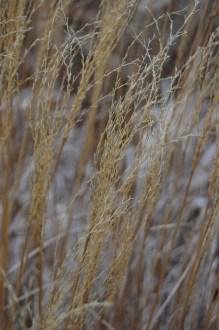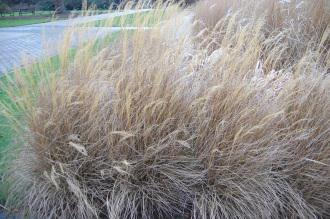
Miscanthus sinensis 'Little Kitten' flower (21/01/2012, Kew, London)
Position: Full sun to partial shade
Flowering period: Late summer
Soil: Moist, well drained
Eventual Height: 80cm
Eventual Spread:45cm
Hardiness: 5a – 9b
Family:Poaceae
Miscanthus sinensis ‘Little Kitten’ is a compact, deciduous, herbaceous perennial grass with a clump forming habit. Its deep green leaves are narrow, upright and arching and are up to 75cm tall. These turn beige during the autumn and are retained on the plant through the winter months. The white (with a hint of purple) flowers of the plant are produced above the foliage in late summer. Light beige seeds heads are produced after the flower and are retained on the plant through the winter months.
The species, Miscanthus sinensis is commonly known as Chinese Silver Grass or Eulalia Grass and is native to much of eastern Asia including Korea, China and Japan.
The etymological root of the binomial name Miscanthus is derived from the Greek name for miskos ‘stem’ and anthos ’flower’, referring to the flowering stems. Sinensis is derived from the Latin meaning ‘from China’.

Miscanthus sinensis 'Little Kitten' (21/01/2012, Kew, London)
The landscape architect may find Miscanthus sinensis ‘Little Kitten’ useful as a low growing grass and looks particularly good when planted en mass. It may form component of a prairie type planting scheme. It is drought tolerant once established. This grass is not attractive to rabbits or deer.
Ecologically, M. sinensis ‘Little Kitten’ is attractive to birds who eat its seeds and to butterfiles.
M. sinensis ‘Little Kitten’ prefers moist, fertile, well-drained soils. It tolerates most pH of soil.
M. sinensis ‘Little Kitten’ requires little maintenance. The grass may be cut down to ground level in late winter before the new foliage appears. Large clumps of this grass may be propagated by division in spring.
Advertisement
